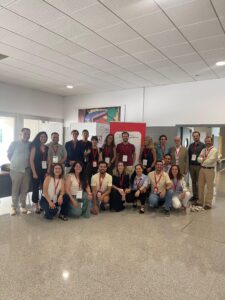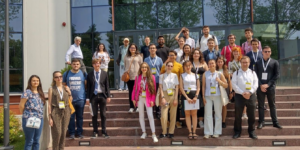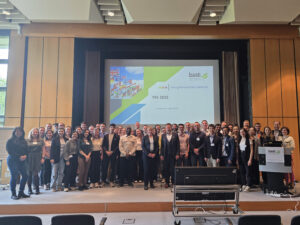TRANSyT researchers participated on January 16 in the CIVINET Spain and Portugal Technical Conference on the challenges of urban public transport: coordination and applied technology.
22-01-2019
Topics covered include institutional coordination, the importance of new technologies and a compilation of good practices in urban mobility.
The Conference began with the first panel, moderated by María Eugenia López Lambas, "Public Transport, Institutional Coordination and Strategies". Yannic Bousse (UITP) explained how public transport authorities help improve the governance of urban mobility. Domingo Martín (CRTM) explained the competence framework of transport in the Community of Madrid and indicated that although in the regulatory framework it clearly differentiates between urban and interurban mobility, in practice the limits are sometimes diffuse. Mauro Gil (INDRA) presented the HARMONY project, in which TRANSyT also participates. Finally, Rocío Cascajo closed this first panel by presenting the Metropolitan Mobility Observatory, formed by more than 20 Public Transport Authorities and which serves as an instrument for sustainable mobility.
 Cristina Peña, from the City Council of Alcobendas, moderated the second panel whose main theme was New Technologies. Javier Peña, spoke of the Master Plan that is being carried out by the City of Alcobendas as a smart city and highlighted the difficulty of carrying it out in medium-sized cities. Finally, he commented on the relationship between the use of the municipal data cloud (sensors, IoT) with governance, in addition to the need to control the ownership and security of data. Ignacio Ramos (EMT) spoke of the user as a producer and consumer of transport data, and of the projects that the EMT is carrying out in this sense.Javier Burrieza (NOMMON) spoke about the new data sources (mobile telephony, wifi, smartcards …) that allow to complement the traditional methodologies of analysis and accompany the study of the new forms of mobility in cities, as well as the opportunities offered by the synergy between data sources applied to public transport, mixing those received from mobile telephony and transport cards, like the one that NOMMON developed for the EMT of Malaga. The panel was concluded by Antonio García Pastor (AVANZA) explaining how they are carrying out their digitalization process and the need to coordinate between transport companies and public administrations to give an integrated solution to the user.
Cristina Peña, from the City Council of Alcobendas, moderated the second panel whose main theme was New Technologies. Javier Peña, spoke of the Master Plan that is being carried out by the City of Alcobendas as a smart city and highlighted the difficulty of carrying it out in medium-sized cities. Finally, he commented on the relationship between the use of the municipal data cloud (sensors, IoT) with governance, in addition to the need to control the ownership and security of data. Ignacio Ramos (EMT) spoke of the user as a producer and consumer of transport data, and of the projects that the EMT is carrying out in this sense.Javier Burrieza (NOMMON) spoke about the new data sources (mobile telephony, wifi, smartcards …) that allow to complement the traditional methodologies of analysis and accompany the study of the new forms of mobility in cities, as well as the opportunities offered by the synergy between data sources applied to public transport, mixing those received from mobile telephony and transport cards, like the one that NOMMON developed for the EMT of Malaga. The panel was concluded by Antonio García Pastor (AVANZA) explaining how they are carrying out their digitalization process and the need to coordinate between transport companies and public administrations to give an integrated solution to the user.
Andrés Monzón presented and moderated the third panel of the Conference on Good Practices in Mobility.Hugo Lucas, councilor of the Municipal Chamber of Torres Vedras (Portugal) presented some actions to improve transport in his municipality in a context of diverse density, using Flexible Public Transport to provide an "effective transport service" to its entire population. Nacho Tomas (Asociación Red de Ciudadaes por la Bicicleta), presented his association and highlighted three commissions: Large cities, Promotion and communication, and Mobility to work. Jesús García (Alcobendas City Council) stressed that mobility is a very important factor for the development of the city and explained the model and tools of mobility management, which must have an organization that believes in sustainable mobility. He also commented on the need to have a complete and detailed x-ray of the city to be able to propose to the Public Authorities that they carry out actions that improve urban transport, and for this the information must be captured through different channels. Isabela Velázquez (GEA21) presented the CIVITAS ECCENTRIC project, coordinated by the Madrid City Council and which focuses on mobility on the outskirts of cities, which in the case of Madrid, the area of action is the Bridge and the Villa de Vallecas. He also presented a pilot experiment carried out in Munich: the "e-mobility stations", which combine the functions of a transport interchange + infrastructure for shared and/or electric mobility + quality urban space. Finally, Carlos Acha (ALSA) posed the question of "why not make transport networks flexible by relying on technology?" and explained the three pillars on which ALSA's operational excellence is based: excellence in safety, customer excellence and excellence in costs.
The Conference was closed by Antonio Pardo (Local Police of Alcobendas), who stressed the importance of giving mobility options in daily trips, and thanked the contribution of all the speakers, especially the organizers Civinet Spain-Portugal, the City Council of Alcobendas and TRANSyT.






